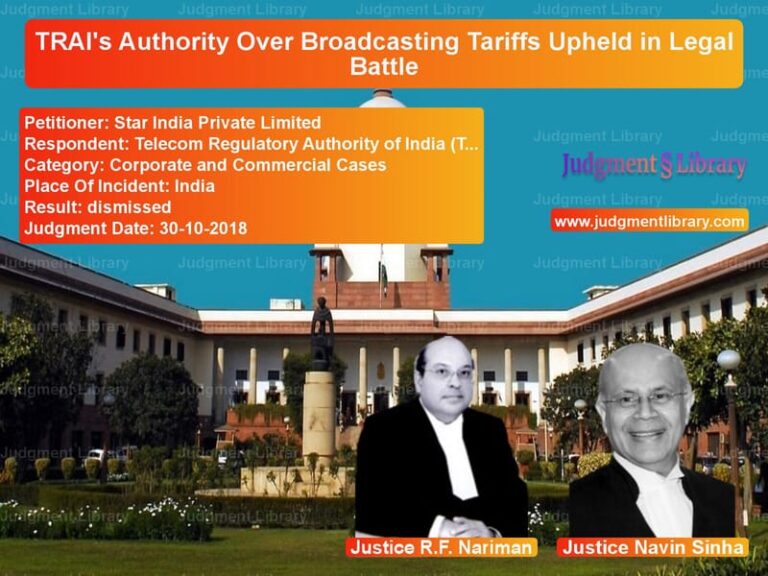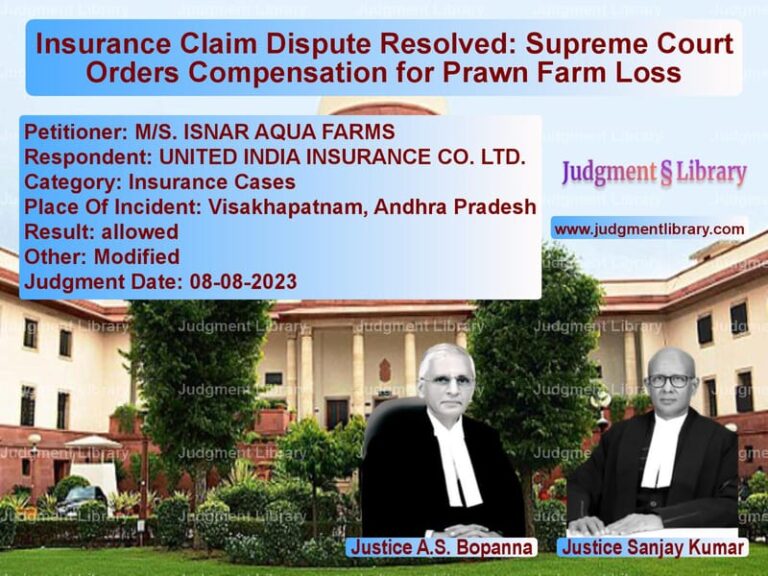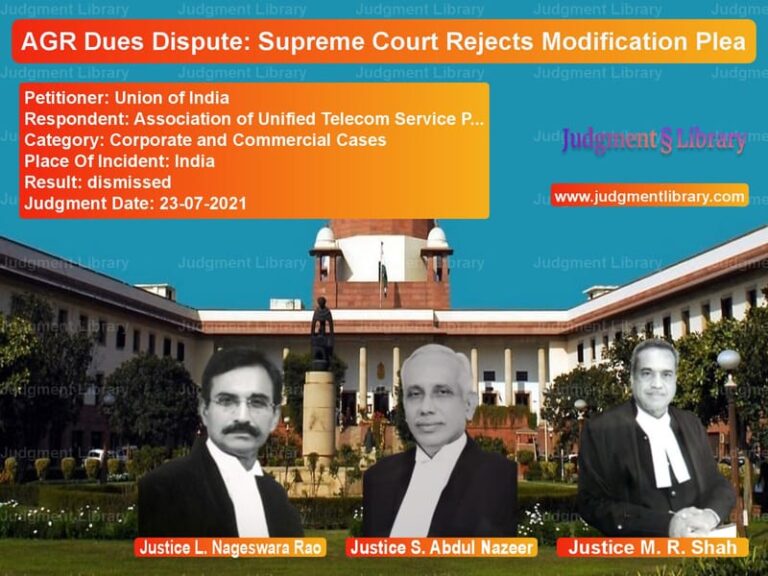Landmark Judgment on Women Officers’ Permanent Commission in Indian Army
The Supreme Court of India delivered a significant judgment in the case of The Secretary, Ministry of Defence v. Babita Puniya & Ors. on February 17, 2020, addressing gender equality in the Indian Army. This ruling ensures that women officers serving under Short Service Commission (SSC) are granted Permanent Commission (PC) at par with their male counterparts.
Background of the Case
The case originated from a long-standing dispute regarding the status of women officers in the Indian Army. Women were first inducted into the Army through the Women Special Entry Scheme (WSES) in 1992, with a tenure of five years. Over the years, the government extended their service tenure, eventually introducing the Short Service Commission (SSC) in 2006, making them eligible for 14 years of service but without the right to PC.
Several women officers challenged this discriminatory policy in the Delhi High Court in 2003 and 2006, seeking parity with their male counterparts. The Delhi High Court, in its 2010 ruling, directed the Union Government to grant PC to women SSC officers at par with men. However, the government delayed its implementation, prompting further litigation.
Key Legal Issues
- Should women SSC officers be granted Permanent Commission at par with their male counterparts?
- Does the denial of PC to women officers violate their fundamental rights under Articles 14, 15, and 16 of the Constitution?
- Can the government impose restrictions on the roles and assignments of women officers in the Army?
Arguments by the Parties
Petitioner: The Secretary, Ministry of Defence
- Women officers were inducted only in select branches, and their roles were limited due to operational concerns.
- Physical and physiological differences between men and women made them unsuitable for command roles.
- Women officers face difficulties in hazardous field areas, including concerns related to hygiene, pregnancy, and motherhood.
- The presence of women officers in all-male units affects unit cohesion.
- National security considerations justified their limited roles.
Respondents: Babita Puniya & Others
- Women officers have been serving for years in critical roles alongside male officers without any performance issues.
- Denial of PC is discriminatory and violates their constitutional rights.
- Women officers have excelled in both field and non-field roles, earning commendations for their service.
- Restricting women officers to staff appointments undermines their professional growth.
- The delay in implementing the Delhi High Court’s 2010 ruling has unfairly denied them career progression.
Supreme Court’s Observations
The judgment, delivered by Justices Dr. Dhananjaya Y. Chandrachud and Ajay Rastogi, strongly criticized the government’s arguments, stating that they were based on gender stereotypes rather than objective criteria. The Court made the following key observations:
1. Gender Stereotypes Cannot Justify Discrimination
The Court rejected the argument that women officers are unfit for command roles due to physical limitations. It stated:
“The submissions advanced are based on sex stereotypes premised on assumptions about socially ascribed roles of gender which discriminate against women.”
2. The Right to Equality and Non-Discrimination
The Court reaffirmed that under Articles 14, 15, and 16 of the Constitution, all citizens must be given equal opportunities in matters of public employment, regardless of gender.
3. No Justification for Excluding Women from Command Roles
The Court noted that women officers have served in forward areas, field units, and peacekeeping missions, proving their capability. Excluding them from command roles was, therefore, unjustified.
4. Denial of Career Progression
The Court observed that denying PC to women officers resulted in a lack of career progression, affecting their pension benefits and long-term career prospects.
5. Government’s Delay in Implementing the 2010 Ruling
The Court criticized the government for not implementing the Delhi High Court’s ruling and observed that its failure had unfairly deprived women officers of promotions and benefits.
Final Judgment and Directions
The Supreme Court ruled in favor of women SSC officers, issuing the following directions:
- Women SSC officers shall be considered for Permanent Commission irrespective of their years of service.
- Those with more than 14 years of service but less than 20 years shall be allowed to serve until they attain pensionable service.
- Women officers who have completed 20 years of service shall be entitled to full pension benefits.
- The restriction that women officers will only be given staff appointments shall not be enforced.
- The government must implement these directions within three months.
Impact of the Judgment
This ruling is a landmark victory for gender equality in the Indian Armed Forces. Its impact includes:
1. Equal Career Opportunities
Women officers will now be able to compete for promotions and leadership roles on an equal footing with men.
2. Enhanced Representation of Women in the Army
With PC now available in all ten streams where women serve, the representation of women in leadership positions will increase.
3. End of Gender-Based Exclusion
The judgment removes the unjustified exclusion of women officers from command roles, paving the way for future generations.
4. Strengthening India’s Military Readiness
The Army can now retain experienced and trained women officers, thereby reducing officer shortages in crucial areas.
Conclusion
The Supreme Court’s ruling in The Secretary, Ministry of Defence v. Babita Puniya & Ors. is a major step toward gender equality in the Indian Armed Forces. By granting women officers Permanent Commission and equal career opportunities, the judgment upholds the fundamental right to equality and dignity. It marks a progressive shift in military policies, ensuring that merit, rather than gender, determines professional advancement in the Indian Army.
Petitioner Name: The Secretary, Ministry of Defence.Respondent Name: Babita Puniya & Ors..Judgment By: Justice Dhananjaya Y Chandrachud, Justice Ajay Rastogi.Place Of Incident: India.Judgment Date: 17-02-2020.
Don’t miss out on the full details! Download the complete judgment in PDF format below and gain valuable insights instantly!
Download Judgment: The Secretary, Minis vs Babita Puniya & Ors. Supreme Court of India Judgment Dated 17-02-2020.pdf
Direct Downlaod Judgment: Direct downlaod this Judgment
See all petitions in Public Sector Employees
See all petitions in Promotion Cases
See all petitions in Recruitment Policies
See all petitions in Judgment by Dhananjaya Y Chandrachud
See all petitions in Judgment by Ajay Rastogi
See all petitions in allowed
See all petitions in supreme court of India judgments February 2020
See all petitions in 2020 judgments
See all posts in Service Matters Category
See all allowed petitions in Service Matters Category
See all Dismissed petitions in Service Matters Category
See all partially allowed petitions in Service Matters Category







